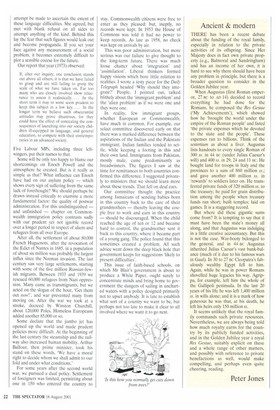Ancient & modern
THERE has been a recent debate about the funding of the royal family, especially in relation to the private activities of its offspring. Since Her Majesty does in fact own private property (e.g., Balmoral and Sandringham) and has an income of her own, it is hard to see why there should have been any problem in principle, but there is a broader question to consider in the Golden Jubilee year.
When Augustus (first Roman emperor, 27 sc to AD 14) decided to record everything he had done for the Romans, he composed the Res Gestae (`My Achievements'), which showed how he 'brought the world under the empire of the Roman people' and listed 'the private expenses which he devoted to the state and the people'. These expenses ran to billions. Think of the sestertium as about a fiver. Augustus lists handouts to every single Roman of 300 ss. in 44 BC (under Julius Caesar's will) and 400 ss. in 29, 24 and 11 sc. He bought land for troops in Italy and the provinces to a sum of 860 million ss.: and gave another 400 million ss. in 'rewards' to soldiers later on. He transferred private funds of 320 million ss. to the treasury; he paid for grain distribution among the people when treasury funds ran short; built temples; laid on games. It is a staggering record.
But where did these gigantic sums come from? It is tempting to say that it must have been the state's money all along, and that Augustus was indulging in a little creative accountancy. But this is not the case. War-booty belonged to the general, and in 44 sc Augustus inherited Julius Caesar's vast bank-balance (much of it due to his famous wars in Gaul). In 30 to 27 sc Cleopatra's fabulously wealthy Egypt fell to him. Again, while he was in power Romans shovelled huge legacies his way. Agrippa, for example, left him the whole of the Gallipoli peninsula. In the last 20 years of his life he was left 1,400 million ss. in wills alone; and it is a mark of how generous he was that, at his death, he left his heirs only 150 million ss.
It seems unlikely that the royal family commands such private resources. Nevertheless, we are always being told how much royalty earns for the country by its publicly funded activities, and in the Golden Jubilee year a royal Res Gestae, suitably explicit on these and a whole range of other matters, and possibly with reference to private benefactions as well, would make compelling, and perhaps even quite cheering, reading.
Peter Jones


























































 Previous page
Previous page